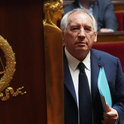The weight of public opinion, according to a YouGov poll today, is against MPs being allowed to work outside of the Commons, and a motion by Labour leader Ed Miliband to prevent members from holding paid directorships or consultancies will be debated this afternoon. But such a move raises questions: is it fair? Do MPs get enough—or even too much—from their £67,000+ annual salary? And are there any outside jobs we would consider it beneficial for an MP to do?
Get a job in Tesco
MPs should be paid substantially more: the rough comparative should be a GP or a secondary headteacher, around £100,000. The public do not agree, but this flows from the fact that MPs are held in disrepute—so the key is to raise the level of respect. There should be limits on what MPs can earn outside—they shouldn't have substantial paid jobs. Some say outside jobs give MPs real-world experience, but you don't need to earn lots of money outside to obtain that. I would encourage MPs to work on the checkout at Tesco, or as a teaching assistant in an inner city school, or as a porter for a week in an NHS hospital, or going to help a British aid mission on the ground in Asia or Africa. Indeed it would be wise for parties to build up an active programme to encourage MPs to spend part of their time in parliamentary recesses on the ground floor of life. Peter Kellner, President of YouGovSliding scale
I first of all think that the Prime Minister should earn as much as the head of the civil service. More therefore that he is now. If things stay as they are I believe MPs should be paid proper salary along the recommendations made by pay review bodies over the past couple of decades (and ignored.) Entry salary should be commensurate to a mid level grade 3(director) in the civil service—just under £80,000. Additional payments for select committees or other involvements rising to director general level- grade 2 , around 120,000(where personal allowances already affected beyond £100,000). No outside interests except books and charitable acts. Of course expenses and office support and researchers should be additional but, as now, carefully controlled. Vicky Pryce, economist and author
Scrap IPSA
The big mistake has been to believe that it is possible to "take the politics out" of MPs' pay. Handing the decision over to IPSA, an independent body, didn’t take the pressure off or make the issue any less contentious. The result is that MPs have had to refuse what they were offered. The solution needs to go with the grain of public opinion. If MPs' pay rose at the same rate as median wages then politicians would only enjoy increases when everyone did. Politicians and the public would be "all in it together:" who could disagree with that? Duncan O'Leary, Research Director at DemosThree times the average
Hearing MPs say they can't be expected to live on an MP's salary alone, when it's nearly three times the national average wage, is a slap in the face for the vast majority of people, who are getting by on much less. The work of an MP is about public service, not about getting the highest possible income. A ban on MPs taking on outside consultancy work should be the very least that we demand. If full-time MPs genuinely think they have the time to take on second jobs, then I'd suggest they're not giving enough attention to the first one—which should have representing their constituents as the overriding priority. Caroline Lucas, Green MP for Brighton PavilionMatch the civil service
Clearly MPs pay is still not a settled issue and the failure to pay MPs properly continues to undermine the credibility and legitimacy of our democratic system. To my mind we should pay MPs properly, which means giving them parity with the top rungs of the public service ladder. To pay them less than most GPs, many headmasters and countless local and national civil servants undermines our democracy and creates all manner of perverse incentives to sell public goods for private gain. Better to ban all second or third jobs unless they pass a public interest test. MP’s should write and speak and lecture and be paid for it—that is part of what we want from them—they could even continue with their own profession (medicine, law, public policy) if it advances and maintains their knowledge and we would benefit from that. But they should never be allowed to contract with a private interest to further that cause. Philip Blond, Director of ResPublicaOut of touch
MPs are already well paid to represent their constituents and the idea that MPs' salaries should increase at a time of austerity in the public sector only underlines how out of touch some members of the Westminster establishment are. The public quite rightly expects that when they elect an MP, they will make representing their constituents their priority—not hiring themselves out to pursue their own personal enrichment. Angus Robertson, Westminster leader of the SNPThis week's Big Question is edited by Josh Lowe and Serena Kutchinsky













